University of Malta, THM1002 e-Tourism: IT in Hospitality Analysis
VerifiedAdded on 2023/01/19
|7
|1591
|31
Report
AI Summary
This report, prepared for the THM1002 e-Tourism module, investigates the evolving influence of Information Technology (IT) on the tourism and hospitality sectors, particularly within the context of Malta. It explores how IT, encompassing computers, networking, and data management, enhances operational efficiency, minimizes costs, and improves customer experiences. The report details the impact of IT on self-service bookings, mobile communications, in-room technology, and customer service. It highlights how the internet and online platforms have transformed booking processes, communication, and service delivery. The analysis covers how IT helps in coordination, online advertising, and providing customer support. The conclusion emphasizes IT's significance in driving productivity and growth within the tourism sector, underscoring its role in shaping modern travel experiences. The report references various books and journals to support its findings.
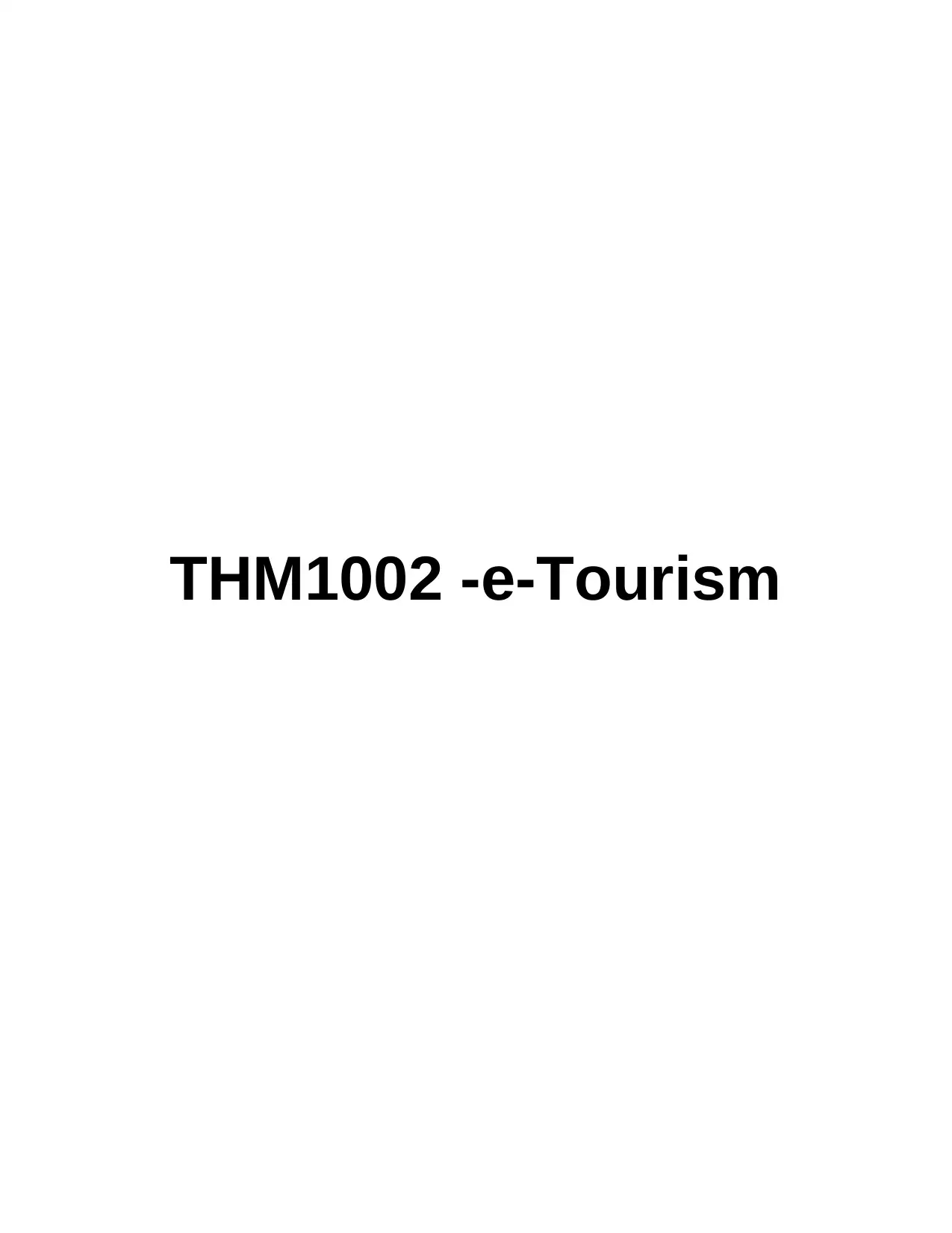
THM1002 -e-Tourism
Paraphrase This Document
Need a fresh take? Get an instant paraphrase of this document with our AI Paraphraser
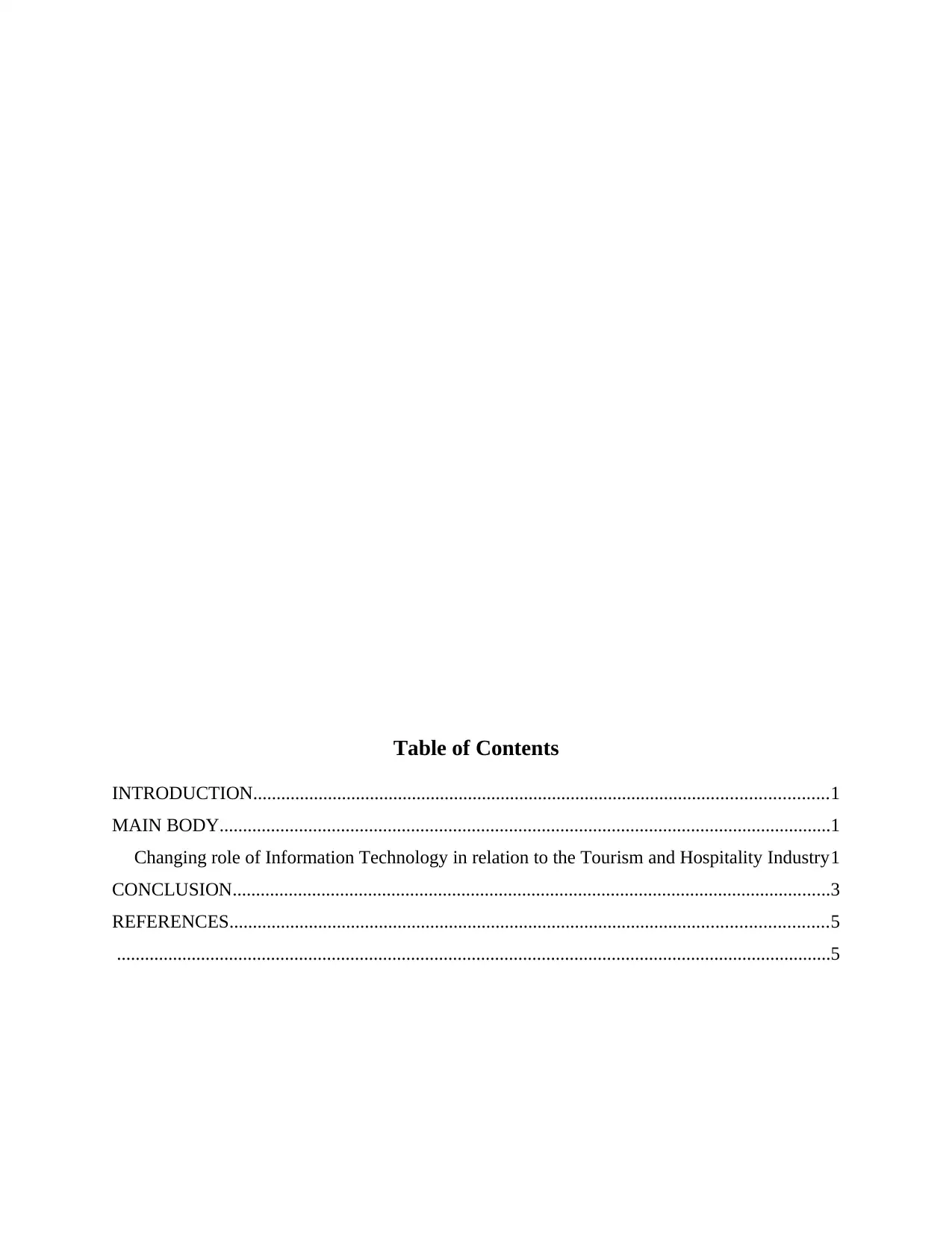
Table of Contents
INTRODUCTION...........................................................................................................................1
MAIN BODY...................................................................................................................................1
Changing role of Information Technology in relation to the Tourism and Hospitality Industry1
CONCLUSION................................................................................................................................3
REFERENCES................................................................................................................................5
.........................................................................................................................................................5
INTRODUCTION...........................................................................................................................1
MAIN BODY...................................................................................................................................1
Changing role of Information Technology in relation to the Tourism and Hospitality Industry1
CONCLUSION................................................................................................................................3
REFERENCES................................................................................................................................5
.........................................................................................................................................................5
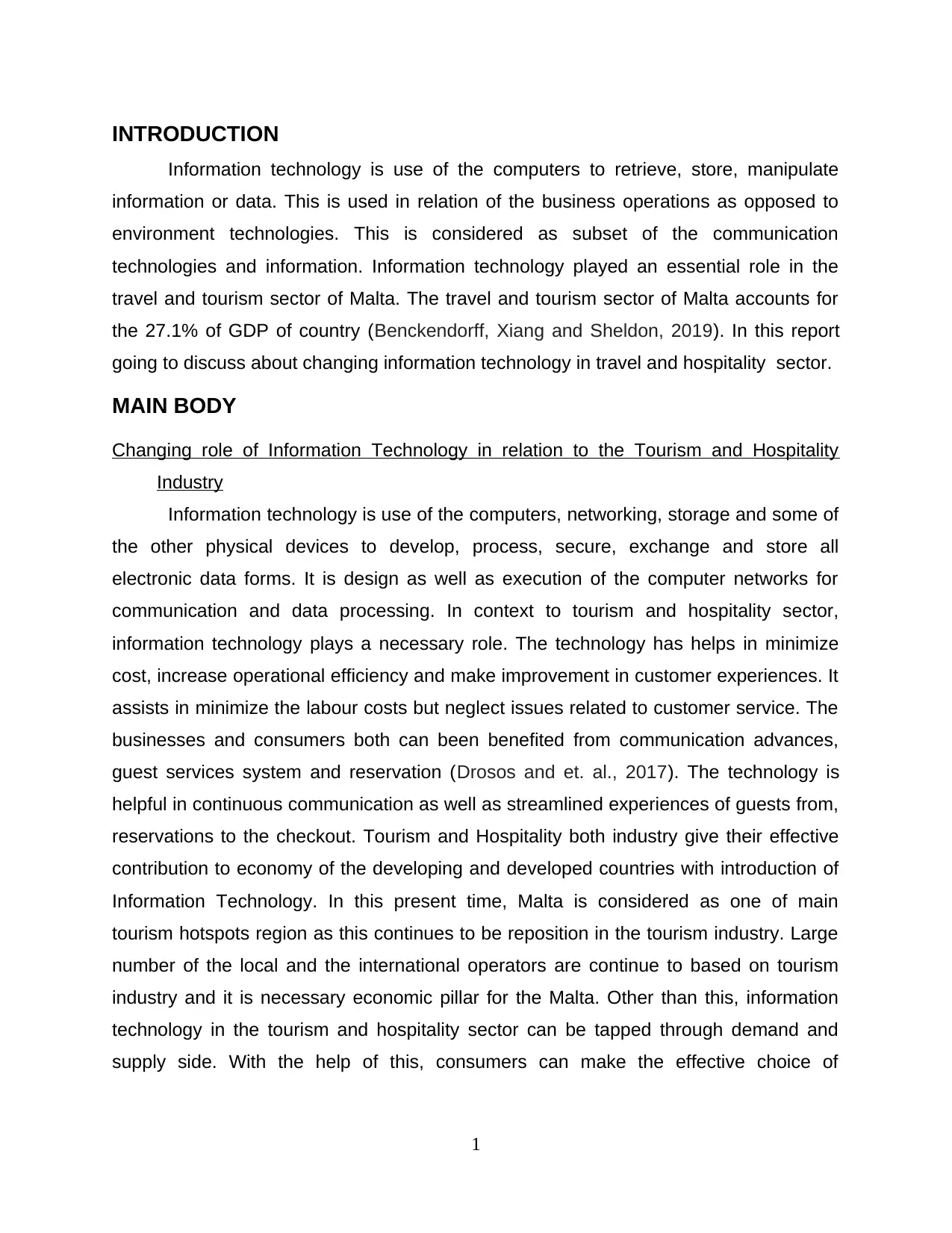
INTRODUCTION
Information technology is use of the computers to retrieve, store, manipulate
information or data. This is used in relation of the business operations as opposed to
environment technologies. This is considered as subset of the communication
technologies and information. Information technology played an essential role in the
travel and tourism sector of Malta. The travel and tourism sector of Malta accounts for
the 27.1% of GDP of country (Benckendorff, Xiang and Sheldon, 2019). In this report
going to discuss about changing information technology in travel and hospitality sector.
MAIN BODY
Changing role of Information Technology in relation to the Tourism and Hospitality
Industry
Information technology is use of the computers, networking, storage and some of
the other physical devices to develop, process, secure, exchange and store all
electronic data forms. It is design as well as execution of the computer networks for
communication and data processing. In context to tourism and hospitality sector,
information technology plays a necessary role. The technology has helps in minimize
cost, increase operational efficiency and make improvement in customer experiences. It
assists in minimize the labour costs but neglect issues related to customer service. The
businesses and consumers both can been benefited from communication advances,
guest services system and reservation (Drosos and et. al., 2017). The technology is
helpful in continuous communication as well as streamlined experiences of guests from,
reservations to the checkout. Tourism and Hospitality both industry give their effective
contribution to economy of the developing and developed countries with introduction of
Information Technology. In this present time, Malta is considered as one of main
tourism hotspots region as this continues to be reposition in the tourism industry. Large
number of the local and the international operators are continue to based on tourism
industry and it is necessary economic pillar for the Malta. Other than this, information
technology in the tourism and hospitality sector can be tapped through demand and
supply side. With the help of this, consumers can make the effective choice of
1
Information technology is use of the computers to retrieve, store, manipulate
information or data. This is used in relation of the business operations as opposed to
environment technologies. This is considered as subset of the communication
technologies and information. Information technology played an essential role in the
travel and tourism sector of Malta. The travel and tourism sector of Malta accounts for
the 27.1% of GDP of country (Benckendorff, Xiang and Sheldon, 2019). In this report
going to discuss about changing information technology in travel and hospitality sector.
MAIN BODY
Changing role of Information Technology in relation to the Tourism and Hospitality
Industry
Information technology is use of the computers, networking, storage and some of
the other physical devices to develop, process, secure, exchange and store all
electronic data forms. It is design as well as execution of the computer networks for
communication and data processing. In context to tourism and hospitality sector,
information technology plays a necessary role. The technology has helps in minimize
cost, increase operational efficiency and make improvement in customer experiences. It
assists in minimize the labour costs but neglect issues related to customer service. The
businesses and consumers both can been benefited from communication advances,
guest services system and reservation (Drosos and et. al., 2017). The technology is
helpful in continuous communication as well as streamlined experiences of guests from,
reservations to the checkout. Tourism and Hospitality both industry give their effective
contribution to economy of the developing and developed countries with introduction of
Information Technology. In this present time, Malta is considered as one of main
tourism hotspots region as this continues to be reposition in the tourism industry. Large
number of the local and the international operators are continue to based on tourism
industry and it is necessary economic pillar for the Malta. Other than this, information
technology in the tourism and hospitality sector can be tapped through demand and
supply side. With the help of this, consumers can make the effective choice of
1
⊘ This is a preview!⊘
Do you want full access?
Subscribe today to unlock all pages.

Trusted by 1+ million students worldwide
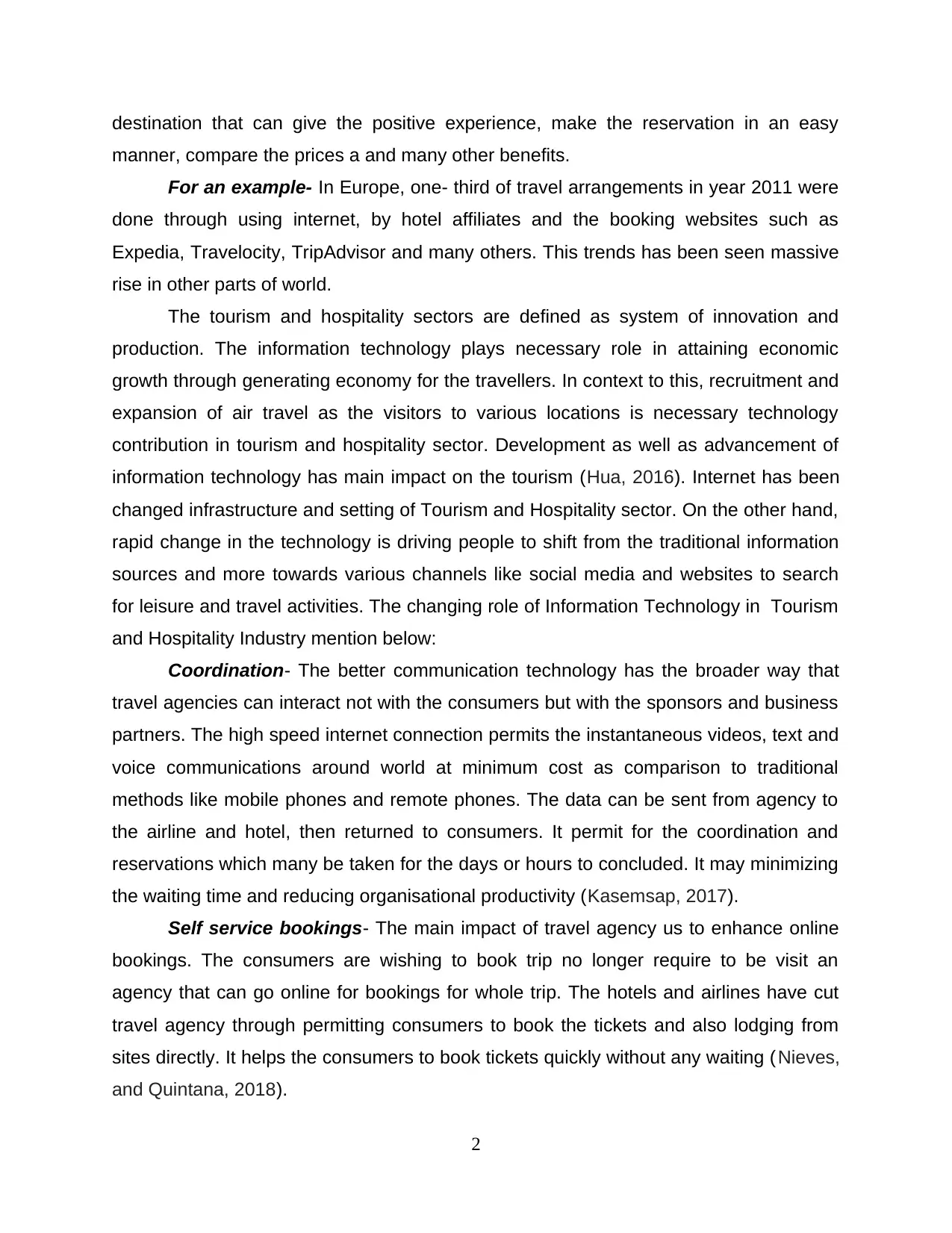
destination that can give the positive experience, make the reservation in an easy
manner, compare the prices a and many other benefits.
For an example- In Europe, one- third of travel arrangements in year 2011 were
done through using internet, by hotel affiliates and the booking websites such as
Expedia, Travelocity, TripAdvisor and many others. This trends has been seen massive
rise in other parts of world.
The tourism and hospitality sectors are defined as system of innovation and
production. The information technology plays necessary role in attaining economic
growth through generating economy for the travellers. In context to this, recruitment and
expansion of air travel as the visitors to various locations is necessary technology
contribution in tourism and hospitality sector. Development as well as advancement of
information technology has main impact on the tourism (Hua, 2016). Internet has been
changed infrastructure and setting of Tourism and Hospitality sector. On the other hand,
rapid change in the technology is driving people to shift from the traditional information
sources and more towards various channels like social media and websites to search
for leisure and travel activities. The changing role of Information Technology in Tourism
and Hospitality Industry mention below:
Coordination- The better communication technology has the broader way that
travel agencies can interact not with the consumers but with the sponsors and business
partners. The high speed internet connection permits the instantaneous videos, text and
voice communications around world at minimum cost as comparison to traditional
methods like mobile phones and remote phones. The data can be sent from agency to
the airline and hotel, then returned to consumers. It permit for the coordination and
reservations which many be taken for the days or hours to concluded. It may minimizing
the waiting time and reducing organisational productivity (Kasemsap, 2017).
Self service bookings- The main impact of travel agency us to enhance online
bookings. The consumers are wishing to book trip no longer require to be visit an
agency that can go online for bookings for whole trip. The hotels and airlines have cut
travel agency through permitting consumers to book the tickets and also lodging from
sites directly. It helps the consumers to book tickets quickly without any waiting ( Nieves,
and Quintana, 2018).
2
manner, compare the prices a and many other benefits.
For an example- In Europe, one- third of travel arrangements in year 2011 were
done through using internet, by hotel affiliates and the booking websites such as
Expedia, Travelocity, TripAdvisor and many others. This trends has been seen massive
rise in other parts of world.
The tourism and hospitality sectors are defined as system of innovation and
production. The information technology plays necessary role in attaining economic
growth through generating economy for the travellers. In context to this, recruitment and
expansion of air travel as the visitors to various locations is necessary technology
contribution in tourism and hospitality sector. Development as well as advancement of
information technology has main impact on the tourism (Hua, 2016). Internet has been
changed infrastructure and setting of Tourism and Hospitality sector. On the other hand,
rapid change in the technology is driving people to shift from the traditional information
sources and more towards various channels like social media and websites to search
for leisure and travel activities. The changing role of Information Technology in Tourism
and Hospitality Industry mention below:
Coordination- The better communication technology has the broader way that
travel agencies can interact not with the consumers but with the sponsors and business
partners. The high speed internet connection permits the instantaneous videos, text and
voice communications around world at minimum cost as comparison to traditional
methods like mobile phones and remote phones. The data can be sent from agency to
the airline and hotel, then returned to consumers. It permit for the coordination and
reservations which many be taken for the days or hours to concluded. It may minimizing
the waiting time and reducing organisational productivity (Kasemsap, 2017).
Self service bookings- The main impact of travel agency us to enhance online
bookings. The consumers are wishing to book trip no longer require to be visit an
agency that can go online for bookings for whole trip. The hotels and airlines have cut
travel agency through permitting consumers to book the tickets and also lodging from
sites directly. It helps the consumers to book tickets quickly without any waiting ( Nieves,
and Quintana, 2018).
2
Paraphrase This Document
Need a fresh take? Get an instant paraphrase of this document with our AI Paraphraser
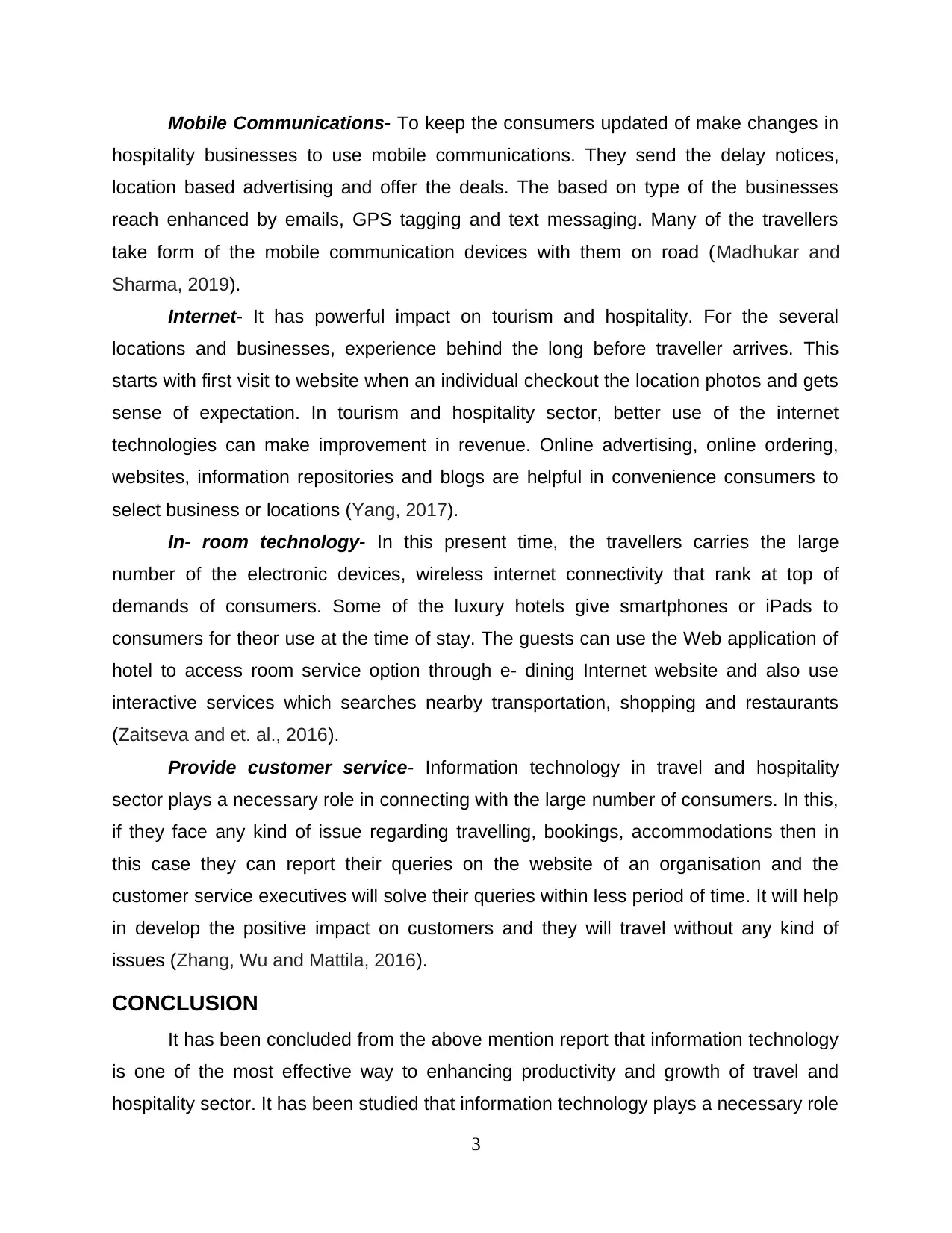
Mobile Communications- To keep the consumers updated of make changes in
hospitality businesses to use mobile communications. They send the delay notices,
location based advertising and offer the deals. The based on type of the businesses
reach enhanced by emails, GPS tagging and text messaging. Many of the travellers
take form of the mobile communication devices with them on road (Madhukar and
Sharma, 2019).
Internet- It has powerful impact on tourism and hospitality. For the several
locations and businesses, experience behind the long before traveller arrives. This
starts with first visit to website when an individual checkout the location photos and gets
sense of expectation. In tourism and hospitality sector, better use of the internet
technologies can make improvement in revenue. Online advertising, online ordering,
websites, information repositories and blogs are helpful in convenience consumers to
select business or locations (Yang, 2017).
In- room technology- In this present time, the travellers carries the large
number of the electronic devices, wireless internet connectivity that rank at top of
demands of consumers. Some of the luxury hotels give smartphones or iPads to
consumers for theor use at the time of stay. The guests can use the Web application of
hotel to access room service option through e- dining Internet website and also use
interactive services which searches nearby transportation, shopping and restaurants
(Zaitseva and et. al., 2016).
Provide customer service- Information technology in travel and hospitality
sector plays a necessary role in connecting with the large number of consumers. In this,
if they face any kind of issue regarding travelling, bookings, accommodations then in
this case they can report their queries on the website of an organisation and the
customer service executives will solve their queries within less period of time. It will help
in develop the positive impact on customers and they will travel without any kind of
issues (Zhang, Wu and Mattila, 2016).
CONCLUSION
It has been concluded from the above mention report that information technology
is one of the most effective way to enhancing productivity and growth of travel and
hospitality sector. It has been studied that information technology plays a necessary role
3
hospitality businesses to use mobile communications. They send the delay notices,
location based advertising and offer the deals. The based on type of the businesses
reach enhanced by emails, GPS tagging and text messaging. Many of the travellers
take form of the mobile communication devices with them on road (Madhukar and
Sharma, 2019).
Internet- It has powerful impact on tourism and hospitality. For the several
locations and businesses, experience behind the long before traveller arrives. This
starts with first visit to website when an individual checkout the location photos and gets
sense of expectation. In tourism and hospitality sector, better use of the internet
technologies can make improvement in revenue. Online advertising, online ordering,
websites, information repositories and blogs are helpful in convenience consumers to
select business or locations (Yang, 2017).
In- room technology- In this present time, the travellers carries the large
number of the electronic devices, wireless internet connectivity that rank at top of
demands of consumers. Some of the luxury hotels give smartphones or iPads to
consumers for theor use at the time of stay. The guests can use the Web application of
hotel to access room service option through e- dining Internet website and also use
interactive services which searches nearby transportation, shopping and restaurants
(Zaitseva and et. al., 2016).
Provide customer service- Information technology in travel and hospitality
sector plays a necessary role in connecting with the large number of consumers. In this,
if they face any kind of issue regarding travelling, bookings, accommodations then in
this case they can report their queries on the website of an organisation and the
customer service executives will solve their queries within less period of time. It will help
in develop the positive impact on customers and they will travel without any kind of
issues (Zhang, Wu and Mattila, 2016).
CONCLUSION
It has been concluded from the above mention report that information technology
is one of the most effective way to enhancing productivity and growth of travel and
hospitality sector. It has been studied that information technology plays a necessary role
3
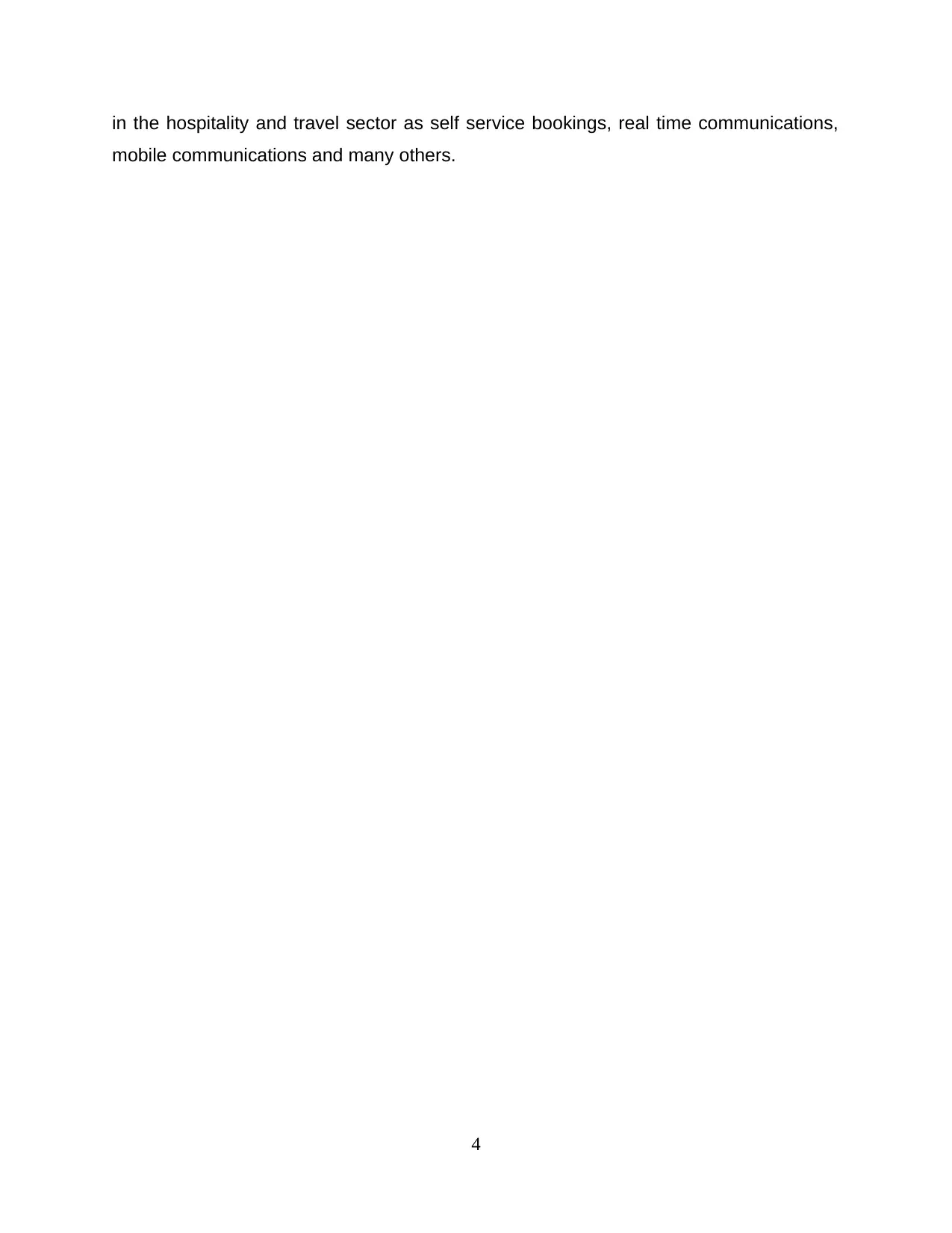
in the hospitality and travel sector as self service bookings, real time communications,
mobile communications and many others.
4
mobile communications and many others.
4
⊘ This is a preview!⊘
Do you want full access?
Subscribe today to unlock all pages.

Trusted by 1+ million students worldwide
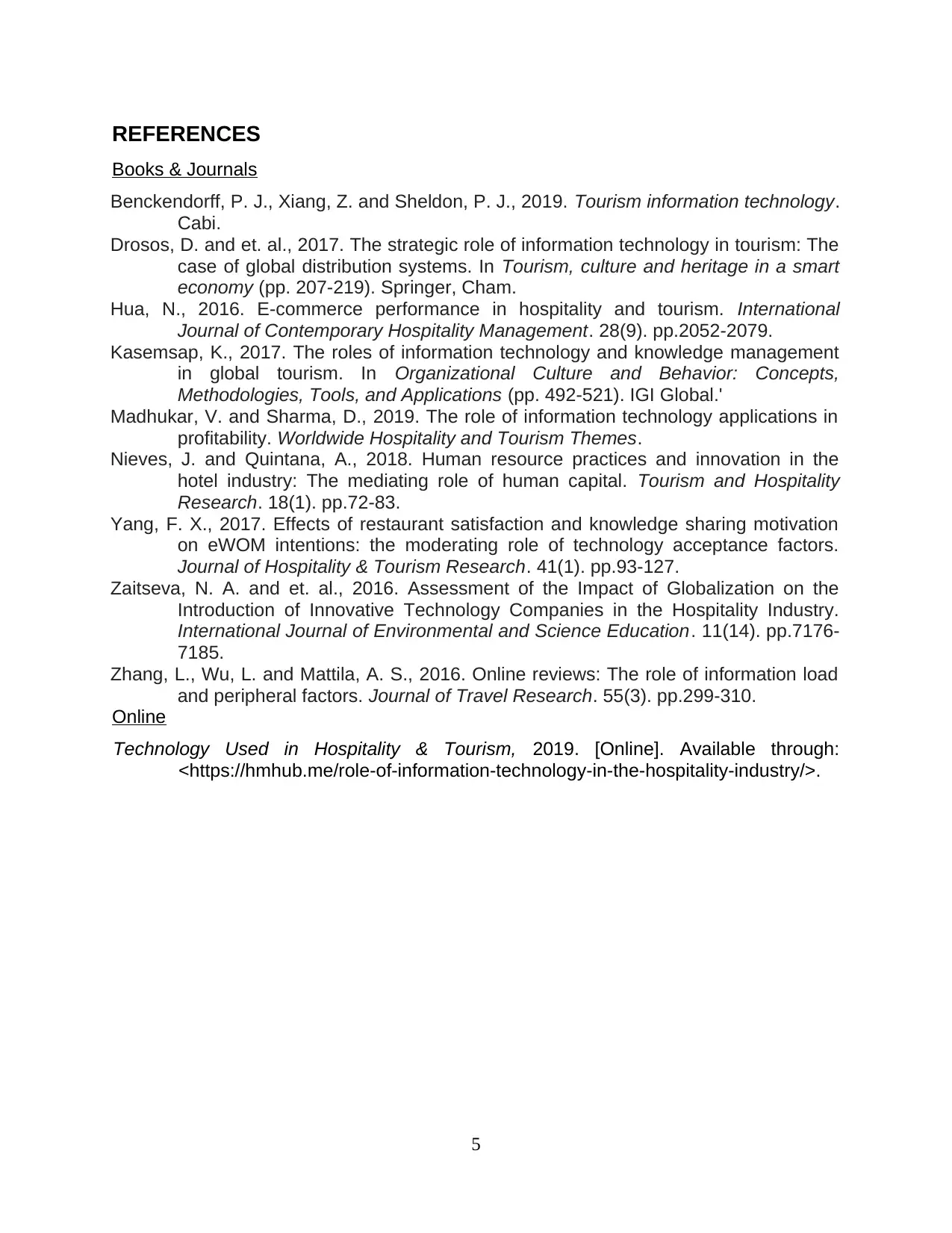
REFERENCES
Books & Journals
Benckendorff, P. J., Xiang, Z. and Sheldon, P. J., 2019. Tourism information technology.
Cabi.
Drosos, D. and et. al., 2017. The strategic role of information technology in tourism: The
case of global distribution systems. In Tourism, culture and heritage in a smart
economy (pp. 207-219). Springer, Cham.
Hua, N., 2016. E-commerce performance in hospitality and tourism. International
Journal of Contemporary Hospitality Management. 28(9). pp.2052-2079.
Kasemsap, K., 2017. The roles of information technology and knowledge management
in global tourism. In Organizational Culture and Behavior: Concepts,
Methodologies, Tools, and Applications (pp. 492-521). IGI Global.'
Madhukar, V. and Sharma, D., 2019. The role of information technology applications in
profitability. Worldwide Hospitality and Tourism Themes.
Nieves, J. and Quintana, A., 2018. Human resource practices and innovation in the
hotel industry: The mediating role of human capital. Tourism and Hospitality
Research. 18(1). pp.72-83.
Yang, F. X., 2017. Effects of restaurant satisfaction and knowledge sharing motivation
on eWOM intentions: the moderating role of technology acceptance factors.
Journal of Hospitality & Tourism Research. 41(1). pp.93-127.
Zaitseva, N. A. and et. al., 2016. Assessment of the Impact of Globalization on the
Introduction of Innovative Technology Companies in the Hospitality Industry.
International Journal of Environmental and Science Education. 11(14). pp.7176-
7185.
Zhang, L., Wu, L. and Mattila, A. S., 2016. Online reviews: The role of information load
and peripheral factors. Journal of Travel Research. 55(3). pp.299-310.
Online
Technology Used in Hospitality & Tourism, 2019. [Online]. Available through:
<https://hmhub.me/role-of-information-technology-in-the-hospitality-industry/>.
5
Books & Journals
Benckendorff, P. J., Xiang, Z. and Sheldon, P. J., 2019. Tourism information technology.
Cabi.
Drosos, D. and et. al., 2017. The strategic role of information technology in tourism: The
case of global distribution systems. In Tourism, culture and heritage in a smart
economy (pp. 207-219). Springer, Cham.
Hua, N., 2016. E-commerce performance in hospitality and tourism. International
Journal of Contemporary Hospitality Management. 28(9). pp.2052-2079.
Kasemsap, K., 2017. The roles of information technology and knowledge management
in global tourism. In Organizational Culture and Behavior: Concepts,
Methodologies, Tools, and Applications (pp. 492-521). IGI Global.'
Madhukar, V. and Sharma, D., 2019. The role of information technology applications in
profitability. Worldwide Hospitality and Tourism Themes.
Nieves, J. and Quintana, A., 2018. Human resource practices and innovation in the
hotel industry: The mediating role of human capital. Tourism and Hospitality
Research. 18(1). pp.72-83.
Yang, F. X., 2017. Effects of restaurant satisfaction and knowledge sharing motivation
on eWOM intentions: the moderating role of technology acceptance factors.
Journal of Hospitality & Tourism Research. 41(1). pp.93-127.
Zaitseva, N. A. and et. al., 2016. Assessment of the Impact of Globalization on the
Introduction of Innovative Technology Companies in the Hospitality Industry.
International Journal of Environmental and Science Education. 11(14). pp.7176-
7185.
Zhang, L., Wu, L. and Mattila, A. S., 2016. Online reviews: The role of information load
and peripheral factors. Journal of Travel Research. 55(3). pp.299-310.
Online
Technology Used in Hospitality & Tourism, 2019. [Online]. Available through:
<https://hmhub.me/role-of-information-technology-in-the-hospitality-industry/>.
5
1 out of 7
Related Documents
Your All-in-One AI-Powered Toolkit for Academic Success.
+13062052269
info@desklib.com
Available 24*7 on WhatsApp / Email
![[object Object]](/_next/static/media/star-bottom.7253800d.svg)
Unlock your academic potential
Copyright © 2020–2026 A2Z Services. All Rights Reserved. Developed and managed by ZUCOL.




